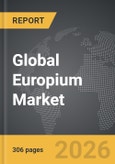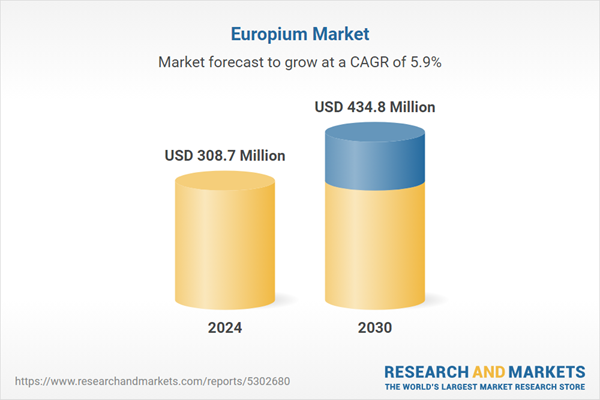Global Europium Market - Key Trends & Growth Drivers Summarized
What Is Europium and Why Is It Vital to Modern Technology?
Europium, a rare earth metal known for its phosphorescent properties, plays a critical role in various high-tech applications, especially in electronics, lighting, and nuclear industries. Its unique ability to emit vibrant red and blue colors when exposed to specific wavelengths of light makes it an essential component in phosphors used in LED displays, flat screens, and energy-efficient lighting. Europium's application in electronic devices is expanding with the rapid growth of consumer electronics, driven by rising demand for high-definition displays in devices like televisions, smartphones, and monitors. In addition to consumer products, europium is also used in medical imaging, particularly in X-ray and MRI technologies, where its phosphorescent properties help enhance image quality. Moreover, the defense sector relies on europium for secure anti-counterfeiting measures on currency and official documents, where europium-doped security inks are used to prevent forgery.Beyond electronics and security, europium is increasingly vital in green energy applications, particularly in photovoltaic cells for solar energy and phosphorescent coatings used in renewable energy applications. As demand for energy-efficient and eco-friendly technologies grows, europium's role as a functional additive in smart lighting solutions and laser technologies becomes more prominent. Europium's importance is further underscored by its use in nuclear reactors as a neutron absorber in control rods, which helps regulate nuclear reactions. With its expanding range of applications across diverse, fast-growing sectors, europium has emerged as a critical element in modern technology, supporting both consumer demands and industrial advancements.
What Technological Advancements Are Shaping the Europium Market?
The europium market has witnessed significant growth due to technological advancements that have expanded its applications and improved extraction and refinement techniques. Innovations in phosphor technology have allowed for more efficient and vibrant displays, with europium-based phosphors being integral in producing the red and blue hues in LED and LCD screens. Furthermore, advancements in LED lighting technology, particularly in white LED applications, have boosted demand for europium, as it enhances brightness and energy efficiency. High-purity europium is now more accessible due to improvements in extraction processes, such as solvent extraction and ion-exchange techniques, which help increase yield while reducing environmental impact.With sustainability becoming a priority in mining and manufacturing, recycling and reusing europium from electronic waste and discarded lighting components is becoming increasingly viable. Research into europium recycling from phosphor powders in end-of-life displays and fluorescent lamps is developing rapidly, driven by the need to reduce reliance on traditional mining and ensure a stable supply chain. Additionally, as researchers explore new uses for europium in quantum dot technology and luminescent materials, especially for energy-efficient displays and next-generation lighting solutions, the market for europium is poised to grow. These technological advancements not only support the scalability of europium applications but also address supply chain sustainability concerns, enabling europium to maintain its relevance in high-tech industries.
Why Are Europium's Applications Expanding Across New Industries?
The versatility of europium is driving its adoption in various emerging sectors, from renewable energy to high-security printing, as industries seek materials that meet both performance and regulatory standards. In the renewable energy sector, europium's role in solar technology is gaining attention, where it contributes to the efficiency of solar panels and photovoltaic cells. This aligns with the global push toward sustainable energy sources, positioning europium as an asset for green energy innovation. In the printing and authentication industries, europium-doped inks are widely used to create anti-counterfeiting features in currency, passports, and other secure documents. This demand is expected to grow as governments and corporations prioritize security in response to rising counterfeiting threats, making europium indispensable in the production of secure and tamper-proof documentation.Additionally, the medical industry is adopting europium-based solutions for advanced imaging and diagnostic tools, where its luminescent properties improve the clarity and accuracy of MRI and X-ray images. The aerospace and automotive industries are also exploring europium's potential in producing lightweight, heat-resistant components for engines and other high-stress applications. With a growing focus on lightweight materials that withstand extreme conditions, europium is becoming an increasingly valuable resource. These expanded applications across new industries reflect the broadening scope of europium's utility, highlighting its role in advancing technology, security, and sustainability across multiple sectors.
What's Driving the Growth of the Global Europium Market?
The growth in the europium market is driven by several factors, primarily technological advancements, diversified end-use applications, and heightened demand for high-performance materials in modern industries. Technological progress in LED and display technologies has been a significant factor, as europium is a key component in producing the vibrant colors that modern consumers expect in screens and lighting. Additionally, as the world transitions toward energy-efficient and eco-friendly technologies, europium's role in advanced lighting and renewable energy applications supports its expanding demand. The rising adoption of europium-based security inks in anti-counterfeiting applications also contributes to market growth, as governments and businesses prioritize document and currency protection in response to global security challenges.The demand for europium is further fueled by its applications in the healthcare industry, where its unique luminescent properties enhance diagnostic imaging. In the defense and aerospace sectors, europium is crucial for high-precision applications, such as lightweight, durable components that can withstand extreme conditions. The recycling of europium from electronic waste has also become a significant driver, as it addresses supply chain sustainability concerns and aligns with the global push for resource conservation. In emerging markets, rising healthcare spending and industrialization are further propelling demand, as europium is integrated into both high-tech and everyday applications. Together, these factors underscore europium's critical role in high-performance materials, technological innovation, and sustainable industry practices, positioning the market for sustained growth.
Report Scope
The report analyzes the Europium market, presented in terms of market value (US$ Thousand). The analysis covers the key segments and geographic regions outlined below.- Segments: Application (Phosphors, Metal Alloys, Glass Additives & Polishing, Permanent Magnets, Catalysts, Other Applications); End-Use (Consumer Electronics, Healthcare, Nuclear Labs, Automotive, Metallurgy, Semiconductors, Other End-Uses).
- Geographic Regions/Countries:World; United States; Canada; Japan; China; Europe (France; Germany; Italy; United Kingdom; Spain; Russia; and Rest of Europe); Asia-Pacific (Australia; India; South Korea; and Rest of Asia-Pacific); Latin America (Argentina; Brazil; Mexico; and Rest of Latin America); Middle East (Iran; Israel; Saudi Arabia; United Arab Emirates; and Rest of Middle East); and Africa.
Key Insights:
- Market Growth: Understand the significant growth trajectory of the Phosphors Application segment, which is expected to reach US$123.2 Million by 2030 with a CAGR of a 7%. The Metal Alloys Application segment is also set to grow at 5% CAGR over the analysis period.
- Regional Analysis: Gain insights into the U.S. market, valued at $80.4 Million in 2024, and China, forecasted to grow at an impressive 8.8% CAGR to reach $98.6 Million by 2030. Discover growth trends in other key regions, including Japan, Canada, Germany, and the Asia-Pacific.
Why You Should Buy This Report:
- Detailed Market Analysis: Access a thorough analysis of the Global Europium Market, covering all major geographic regions and market segments.
- Competitive Insights: Get an overview of the competitive landscape, including the market presence of major players across different geographies.
- Future Trends and Drivers: Understand the key trends and drivers shaping the future of the Global Europium Market.
- Actionable Insights: Benefit from actionable insights that can help you identify new revenue opportunities and make strategic business decisions.
Key Questions Answered:
- How is the Global Europium Market expected to evolve by 2030?
- What are the main drivers and restraints affecting the market?
- Which market segments will grow the most over the forecast period?
- How will market shares for different regions and segments change by 2030?
- Who are the leading players in the market, and what are their prospects?
Report Features:
- Comprehensive Market Data: Independent analysis of annual sales and market forecasts in US$ Million from 2024 to 2030.
- In-Depth Regional Analysis: Detailed insights into key markets, including the U.S., China, Japan, Canada, Europe, Asia-Pacific, Latin America, Middle East, and Africa.
- Company Profiles: Coverage of players such as ACI Alloys Inc., All-Chemie Ltd., American Elements, Arafura Resources Ltd., Avalon Advanced Materials Inc. and more.
- Complimentary Updates: Receive free report updates for one year to keep you informed of the latest market developments.
Some of the 48 companies featured in this Europium market report include:
- ACI Alloys Inc.
- All-Chemie Ltd.
- American Elements
- Arafura Resources Ltd.
- Avalon Advanced Materials Inc.
- Canada Rare Earth Corporation
- China Minmetals Corporation
- Hastings Technology Metals Ltd
- Indian Rare Earth Ltd.
- Lynas Corporation Ltd.
- Neo Performance Materials
- Rare Element Resources Ltd.
This edition integrates the latest global trade and economic shifts into comprehensive market analysis. Key updates include:
- Tariff and Trade Impact: Insights into global tariff negotiations across 180+ countries, with analysis of supply chain turbulence, sourcing disruptions, and geographic realignment. Special focus on 2025 as a pivotal year for trade tensions, including updated perspectives on the Trump-era tariffs.
- Adjusted Forecasts and Analytics: Revised global and regional market forecasts through 2030, incorporating tariff effects, economic uncertainty, and structural changes in globalization. Includes historical analysis from 2015 to 2023.
- Strategic Market Dynamics: Evaluation of revised market prospects, regional outlooks, and key economic indicators such as population and urbanization trends.
- Innovation & Technology Trends: Latest developments in product and process innovation, emerging technologies, and key industry drivers shaping the competitive landscape.
- Competitive Intelligence: Updated global market share estimates for 2025, competitive positioning of major players (Strong/Active/Niche/Trivial), and refined focus on leading global brands and core players.
- Expert Insight & Commentary: Strategic analysis from economists, trade experts, and domain specialists to contextualize market shifts and identify emerging opportunities.
Table of Contents
Companies Mentioned (Partial List)
A selection of companies mentioned in this report includes, but is not limited to:
- ACI Alloys Inc.
- All-Chemie Ltd.
- American Elements
- Arafura Resources Ltd.
- Avalon Advanced Materials Inc.
- Canada Rare Earth Corporation
- China Minmetals Corporation
- Hastings Technology Metals Ltd
- Indian Rare Earth Ltd.
- Lynas Corporation Ltd.
- Neo Performance Materials
- Rare Element Resources Ltd.
Table Information
| Report Attribute | Details |
|---|---|
| No. of Pages | 306 |
| Published | February 2026 |
| Forecast Period | 2024 - 2030 |
| Estimated Market Value ( USD | $ 308.7 Million |
| Forecasted Market Value ( USD | $ 434.8 Million |
| Compound Annual Growth Rate | 5.9% |
| Regions Covered | Global |









